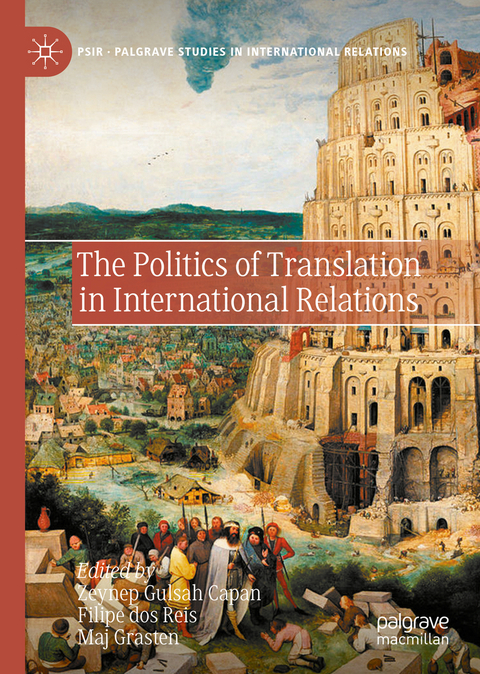
The Politics of Translation in International Relations
Springer International Publishing (Verlag)
978-3-030-56885-6 (ISBN)
lt;p>
Zeynep Gulsah Capan is Lecturer at the University of Erfurt, Germany. Her research focuses on history and historiography, de- and postcolonial thought, and Eurocentrism.
Filipe dos Reis is Assistant Professor in the Department of International Relations and International Organization, University of Groningen, Netherlands. His current research focuses on the history and politics of international law, imperial Germany, and maps.
Maj Grasten is Assistant Professor at the Department of Management, Politics and Philosophy, Copenhagen Business School, Denmark. Her research sits at the intersection of Socio-Legal Studies and Global Governance, with particular focus on international organizations and legal bodies, experts and knowledge production in international law, and the legal foundations of markets.
Chapter 1: Introduction: The Politics of Translation in International Relations; Zeynep Gulsah Capan, Filipe dos Reis, and Maj Grasten.- Part I: Translation and the Politics of (Disciplinary) Language.- Chapter 2: Gavagai? The International Politics of Translation; Benjamin Herborth.- Chapter 3: Conceptual Debates in IR and the Spectre of Polysemy: Intralingual Challenges and the Promise of Translation; Torsten Michel.- Chapter 4: Remaking the Law of Encounter: Comparative International Law as Transformative Translation; Miriam Bak McKenna.- Part II: Translating Across Fields of Practice.- Chapter 5: Fashioning the Other: Fashion as an Epistemology of Translation; Andreas Behnke.- Chapter 6: De/Colonising Through Translation? Rethinking the Politics of Translation in the Women, Peace and Security Agenda; Rahel Kunz.- Chapter 7: Translating Critique: Civil Society and the Politicisation of Financial Regulation; Benjamin Wilhelm.- Chapter 8: Social Movements and Translation; Nicole Doerr.- Part III: Translating International Relations (IR).- Chapter 9: English and the Legacy of Linguistic Domination in IR; Shogo Suzuki.- Chapter 10: On the Power of Translation and the Translation of 'Power': A Translingual Concept Analysis; Ariel Shangguan.- Chapter 11: Anarchy is What Translators Make of It? Translating Theory and Translation Theories; Fatmanur Kaçar.- Part IV: Reflections.- Chapter 12: The Contingency of Translation; Oliver Kessler.- Chapter 13: On the 'Does Theory Travel?' Question: Traveling with Edward Said; Pinar Bilgin.
"Overall, the book is an exceptional contribution to existing literature on several counts. ... it effectively demonstrates that translation ... . the use of carefully selected case studies from a range of IR sub domains successfully anchors the book's ambitious theoretical reach and scope. Overall, an interesting and recommended read for all scholars in the field of language and politics." (Kanglong Liu, Journal of Language and Politics, Vol. 21 (1), 2022)
“Overall, the book is an exceptional contribution to existing literature on several counts. ... it effectively demonstrates that translation ... . the use of carefully selected case studies from a range of IR sub domains successfully anchors the book's ambitious theoretical reach and scope. Overall, an interesting and recommended read for all scholars in the field of language and politics." (Kanglong Liu, Journal of Language and Politics, Vol. 21 (1), 2022)
| Erscheinungsdatum | 12.01.2021 |
|---|---|
| Reihe/Serie | Palgrave Studies in International Relations |
| Zusatzinfo | XII, 266 p. 1 illus. |
| Verlagsort | Cham |
| Sprache | englisch |
| Maße | 148 x 210 mm |
| Gewicht | 493 g |
| Themenwelt | Geisteswissenschaften ► Sprach- / Literaturwissenschaft ► Sprachwissenschaft |
| Sozialwissenschaften ► Politik / Verwaltung ► Europäische / Internationale Politik | |
| Sozialwissenschaften ► Politik / Verwaltung ► Politische Theorie | |
| Sozialwissenschaften ► Politik / Verwaltung ► Vergleichende Politikwissenschaften | |
| Schlagworte | global orders • International Relations • IR • language • Language in international relations • Politics of translation • Power • Subjectivity • Translating Across Fields of Practice |
| ISBN-10 | 3-030-56885-7 / 3030568857 |
| ISBN-13 | 978-3-030-56885-6 / 9783030568856 |
| Zustand | Neuware |
| Haben Sie eine Frage zum Produkt? |
aus dem Bereich


